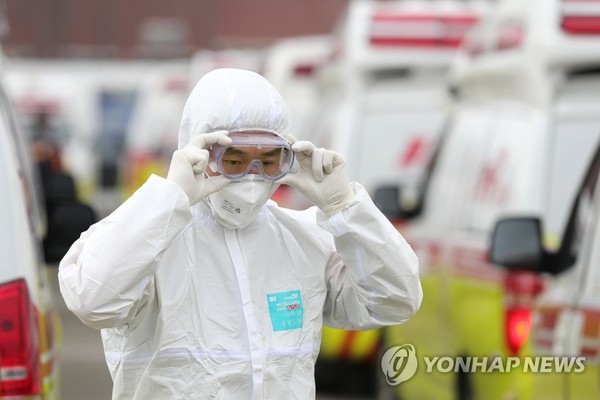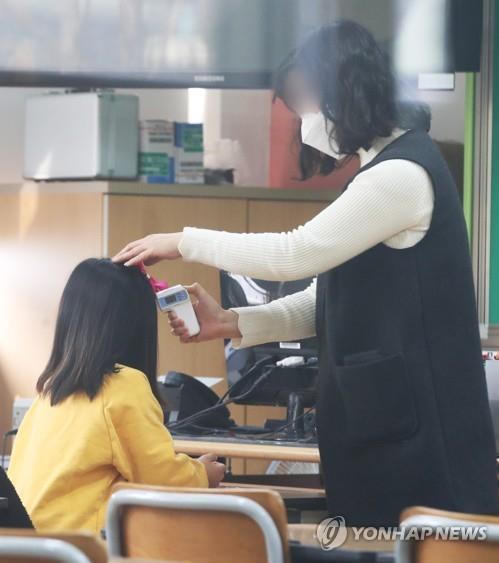South Korea reported a continued rise in the confirmed cases of the new coronavirus on Monday, bringing the total infections here to more than 4,300.
School breaks were again extended nationwide, until March 23, as the nation provides an "all-out response" to the fast-spreading virus that includes a massive testing program.

The 599 new cases of the novel coronavirus brought the nation's total number of infections here to 4,335, according to the Korea Centers for Disease Control and Prevention (KCDC).
Monday's additional cases followed the nation's sharpest daily spikes of 1,062 on Sunday and 813 on Saturday.
So far, 26 people, mostly ones with underlying illnesses, have died here from COVID-19, which first emerged in China. Four new deaths were reported earlier in the day, including an 82-year-old man and an 87-year-old woman.
The spring term for kindergartens and elementary, middle and high schools had been delayed by one week to Sunday, but the education ministry said Monday it will postpone the new school term by another two weeks until March 23 as a precautionary measure to contain further spread of the virus.
About 57 percent of confirmed cases have been linked to a branch of the Shincheonji religious sect in the southeastern city of Daegu. Most confirmed cases with unknown origins in Daegu and North Gyeongsang Province, the epicenters of the virus outbreak here, are believed to be tied to the religious group, officials said.
The total number of cases in Daegu, 300 kilometers southeast of Seoul, and its neighboring North Gyeongsang stood at 3,081 and 624, respectively.
Aside from Daegu and North Gyeongsang, cases of community spread with unknown origins are gradually on the rise. Seoul's confirmed cases rose by four to 91, with dozens of cases believed to be linked to Eunpyeong St. Mary's Hospital in the Eunpyeong district.
The virus cases in Busan rose by five to 88, with 32 patients linked to a Christian church in the Dongnae district. The 32 patients of the Oncheon church in Busan are tied to the church's three-day retreat that ended on Feb. 17, officials said. It is still unclear how they were infected with the virus.
In the central cities of Cheonan and Asan, 63.1 percent of the total 76 patients came from a Zumba dance class in Cheonan, officials said.
To minimize deaths from the virus, KCDC Director-General Jeong Eun-kyeong told reporters that the health authorities had revised government guidelines to allow critically ill patients to be swiftly treated in so-called negative-pressure rooms at hospitals from Monday.
So far, virus patients with mild or moderate symptoms have also been allowed to receive treatment at such facilities, which are designed to prevent infectious diseases from spreading within hospitals.
The previous guideline was mapped out in 2015 when the country braced for the MERS outbreak, but critics say it was not fit for the fast-spreading new coronavirus as negative-pressure rooms are overwhelmed.
Patients with mild or moderate symptoms will be admitted to state-run isolation facilities, Jeong said.
With virus patients in Daegu skyrocketing, the city's hospitals have been overwhelmed and an increasing number of doctors and nurses in the city have been vulnerable to infection.
Vice Health Minister Kim Gang-lip said in a daily briefing that the government opened an isolation facility in Daegu where virus patients with mild symptoms can be admitted.
About 160 patients will be admitted to the facility, Kim said, adding that two more of such facilities will be set up this week.
On Sunday, President Moon Jae-in said the government "is now waging an all-out response after raising the crisis alert to the highest level."
In Daegu and North Gyeongsang, temporary treatment facilities will be expanded to exclusively handle suspected cases and diagnostic examinations, Moon said.
"I believe that an increasing number of people will join these efforts and that we will succeed in defeating the virus without fail," Moon said.
Experts said the number of confirmed cases is expected to increase in the coming days as health authorities have begun testing more than 210,000 members of the Shincheonji Church of Jesus at the center of the rapid spread in other provinces.
After the first outbreak on Jan. 20 in South Korea, the pace of infections had not been alarming until Feb. 18, when a 61-year-old woman who is tied to the Daegu religious sect tested positive for the virus.
Since then, the nation has seen an explosion in infections as it accelerated virus tests on potential cases.
Shincheonji's controversial founder, Lee Man-hee, made a public apology for the spread of the disease.
Bowing his head to the floor, Lee offered his "sincere apology" to the public and said he tested negative for the virus.
South Korea had released 31 fully recovered novel coronavirus patients from hospitals as of midnight Sunday, and two more patients will be given the all-clear later in the day, the KCDC said.
The number of people being checked for the virus and under quarantine came to 33,799, it added. The country has tested a total of 105,379 suspected cases, with 71,580 testing negative.
Currently, there is no evidence that the new coronavirus is airborne. The World Health Organization said the virus is transmitted through droplets or close contact. The best measure to protect yourself from the virus is to wash your hands with soap for at least 20 seconds and avoid mass gatherings, health officials said.
To help raise awareness of the virus among foreigners in South Korea, Arirang TV and the state-run Korea Culture and Information Service (KOCIS) said they are offering simultaneous English-language translation services on daily media briefings by health authorities via Arirang TV's Youtube channel (www.youtube.com/user/arirang) and the website of KOCIS (www.korea.net) at 11:00 a.m. and 2 p.m. (Yonhap)


